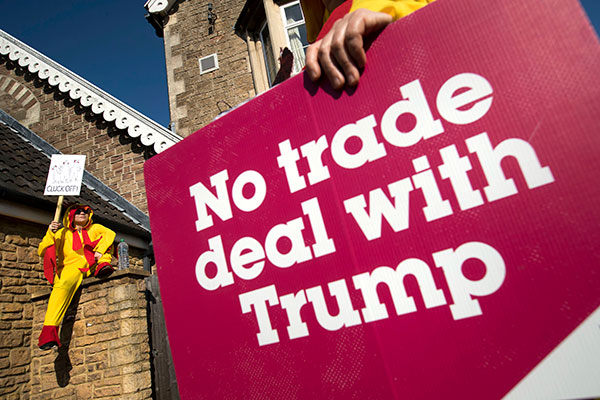It has been dubbed the most significant reform of UK farming policy in a generation, and rightly so. The Agriculture Bill, which last week passed through the House of Commons after its third reading, is Britain’s chance to shape the future of British agriculture after Brexit and there is a lot at stake, from food security, to environmental protection, to trade and standards.
Disappointing, then, that last week a big opportunity was missed to uphold, and hopefully improve, the UK’s farming standards outside of the EU’s Common Agricultural Policy (CAP).
On the face of it, the legislation sets out to boost productivity and reward farmers for protecting the environment. A central principle of the legislation – and one that has attracted broad support – is the overhaul of the subsidy system to support farmers. The government wants the current system to be replaced by the principle of ‘public money for public goods’, including things like better air and water quality, higher animal welfare standards, improved access to the countryside, and measures to reduce flooding.

A slippery slope for standards?
But, so far, a major shortcoming in the proposed Bill is the lack of any formal requirement to uphold the UK’s food production standards, as we negotiate post-Brexit trade deals with the likes of the US, Australia and Japan.
Last week, MPs were asked to vote on several amendments to the Bill and the biggest talking point related to future trade deals. Backed by an unprecedented coalition of 62 farming, environmental and animal welfare organisations, senior Conservatives Simon Hoare and Neil Parish led the charge for an amendment to ensure a “level playing field” between British and overseas farmers in future trade agreements.
The idea was to ensure that the UK’s (relatively) high environmental, animal welfare and food safety standards would have to be met by any imported produce entering the country, thus banning things like American chlorine-washed chicken or hormone-fed beef. But the amendment was defeated by 277 votes to 328, even though some Tory MPs, including chancellor Rishi Sunak, voted in favour by accident due to “online teething problems” with a new electronic voting system.

The NFU’s Nick von Westenholz called the result “disappointing”, while the Soil Association stressed that “this is the time to be raising, not undermining our standards”. The organic certification body added that “far from ‘taking back control’ and ‘achieving so much more for farmers and our environment’, the rejection of this amendment could undermine any hope of a ‘Green Brexit’ or a healthier and more sustainable farming sector.”
Powers, not duties
In the last two years, the government has issued countless promises that it will deliver a ‘Green Brexit’ and uphold UK import standards in its free trade agreements, a rhetoric that has been proved empty after last week’s blocking of efforts to enshrine those very safeguards in legislation.
While inevitably partisan in her response, the shadow international trade secretary Emily Thornberry echoed the feelings of many farmers and environmentalists. “We need a government that will stand up for our farmers and consumers in these talks, not one that is desperately trying to please Donald Trump and fill the trade void after Brexit,” she said.

Indeed, it is important to realise that the Agriculture Bill is merely a ‘legislative framework’ and a lot of its clauses give the government powers (the authority to act) rather than duties (the obligation to do so), against which it could be held accountable. “This is a big gap,” says Vicki Hird, of sustainable food alliance Sustain, which is part of the coalition to amend the Bill.
On the environment, a key concern is that the public goods approach could ultimately be too narrowly defined, focusing on specific outcomes such as boosting the population of a particular species of bird. “We think that’s not enough now,” says Hird. “There’s a lot more that’s needed. We should be switching to whole-farm, agroecological and regenerative farming systems.”
As well as import standards, agroecology – the practice of ecologically-sensitive agriculture – is an issue that many environmentalists want to see feature more prominently in the Bill.
Labour’s Kerry McCarthy tabled an amendment for financial support to be offered for “establishing and maintaining whole farm agroecological systems”, while the Greens’ Caroline Lucas tabled an amendment on protection for human health from agricultural pesticides. The latter, although selected by the speaker, missed out on going to a vote due to the limited abilities on the remote voting system, an outcome described as “frustrating” by pesticides campaigner, Georgina Downs, who said it would have been beneficial to have on record who voted for and against.
Not over yet
Despite the outcome of last week’s votes, there is cause for optimism. As the Bill now passes to the House of Lords, campaigners are hopeful that the legislation could meet with opposition and be passed back to the Commons.
“The votes on 13 May were unsurprising,” says Hird. “With the government majority as it is, we knew they would use all their whipping powers to make sure no amendments got through, but it was encouraging to see the level of concern from conservative MPs [22 of whom rebelled]. The coalition’s beginning to bear fruit I think, but we need to push hard for the next two stages of the Bill.”















0 Comments